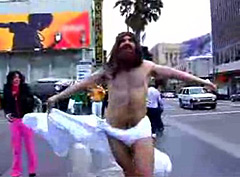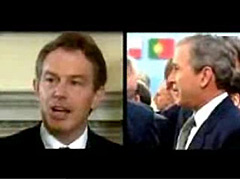The fundamental change is the fact that code had been used to create things like printer-drivers and such. But - since a few years, code, or rather the tools that had been coded have become a main element in the creation of culture as we use and witness it today. Especially the whole mashup-culture is heavily relying on the techniques and the mindset of digital creation and open access to other's works for sampling from and building upon, etc. Popular examples are the anime music-clip subculture like the Muppet Hunter, the Jesus Christ the Musical-clip or lots of pieces that borrow from news networks' footage to make their own suggestive edits.
 So you could regard this as the pinnacle of today's tools of creativity, even the most important contemporary form of expression, probably even replacing speech and text in an American mass-media context as the main means to reach people. Having said this (and that's a bit of a rhetorical trick), he argued that threatening the freedom of this kind of usage of media equals threatening the freedom of speech itself. But, and that's a fact, the nagging question is whether this form of expression is legal or not, both in the US and elsewhere. Lessig told of a recent meeting in NYC where lawyers tried to explain the four conditions which you have to fullfill to be able to work under the law of Fair use. It took four lawyers, one hour and in the end the audience was only more confused. To him he said, it seemed a bit like the the Soviet Union somewhere in between the height of its power and its downfall and brought up the question just how you could have convinced the Soviet officials to change their system in that era.
So you could regard this as the pinnacle of today's tools of creativity, even the most important contemporary form of expression, probably even replacing speech and text in an American mass-media context as the main means to reach people. Having said this (and that's a bit of a rhetorical trick), he argued that threatening the freedom of this kind of usage of media equals threatening the freedom of speech itself. But, and that's a fact, the nagging question is whether this form of expression is legal or not, both in the US and elsewhere. Lessig told of a recent meeting in NYC where lawyers tried to explain the four conditions which you have to fullfill to be able to work under the law of Fair use. It took four lawyers, one hour and in the end the audience was only more confused. To him he said, it seemed a bit like the the Soviet Union somewhere in between the height of its power and its downfall and brought up the question just how you could have convinced the Soviet officials to change their system in that era.  In his view, the system as it exists today doesn't work anymore (and it's constantly being ignored by many people because of that) and needs to be changed, so how would that work?
In his view, the system as it exists today doesn't work anymore (and it's constantly being ignored by many people because of that) and needs to be changed, so how would that work?
You can find some more pictures on the 23C3-pool on Flickr and an actual gnu was also spotted at the venue.
Here's the complete talk on Google Video. (Via Joi Ito)

